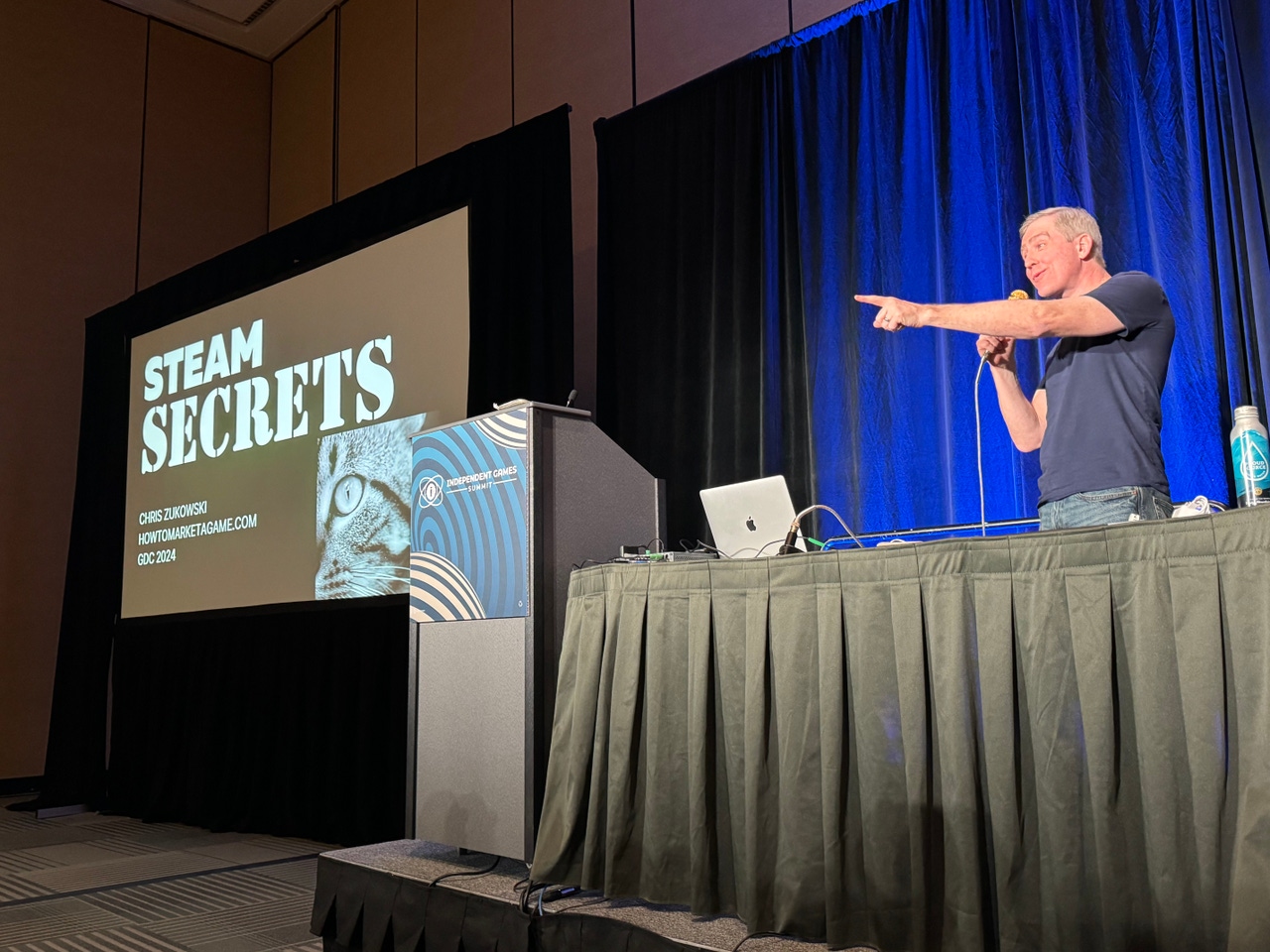Trending
Opinion: How will Project 2025 impact game developers?
The Heritage Foundation's manifesto for the possible next administration could do great harm to many, including large portions of the game development community.

Read More from GDC 2024 | Keep up with the latest game industry event coverage from GDC 2024, including news, talks, interviews, and more from the Game Developer team.
Chris Zukowski argues that Valve can do a lot to help your game become more visible, which is worth its weight in gold. All you have to do is ask.

In a GDC 2024 talk, marketing expert Chris Zukowski—author of How to Market a Game—purported to tell the packed room of attendees the secret to selling your game on Steam. As the panel began, Zukowski warned that he had 143 slides to get through in 30 minutes.
"You can do the math on that."
While Zukowski went into detail on various aspects of how Steam worked, it can all be fairly summarized in one of the earliest of his nearly-150 slides: "The secret to Steam is asking for shit."
Secret #1: Steam will give you more visibility than anything you can ever generate alone.
Secret #2: There are secretly two Steam stores.
Secret #3: Steam is actually a curated service, but only if you ask for shit.
Secret #4: The most important page on Steam is the Support page.
Armed with a warning that the Steam algorithm changes all the time and this information can be outdated at any point or on Valve’s whim, Zukowski launched into a manic expounding of the secrets he had just introduced. This starts with the foundation that there are three kinds of developers on Steam: Early Indie, people on Real Steam, and the Mega Popular. Not all aspects apply to everyone equally.
Zukowski argued that the most important thing Early Indie developers can do is translate their store pages and demos, even if the final game is not translated. He recommended Simplified Chinese, Japanese, Korean, and then FIGS (French, Italian, German, Spanish) in that order of priority.
"Simplified Chinese has overtaken English in the languages spoken on Steam. It may seem like a big expense but it is absolutely worth every penny. A lot of non-english speakers play demos."
The key to success on Steam, Zukowski explained, is getting yourself in the Top Upcoming list. This requires about 1000 wishlists a day. Getting 5000-7000 wishlists will likely you put you on track for that number and being put in the top ten for Top Upcoming is a matter of timing rather than a measure of popularity among the ten.
The majority of the rest of Zukowski’s talk was centered on his thesis that Valve is surprisingly open to requests, as long as they are made with logistical sense. Valve, Zukowski emphasized, wants to make money off game sales, so they will listen whatever sells more games and whomever sells more games. Those who make quite a bit of money of Steam are more likely to have Valve’s ear when it comes to Festival inclusions, collaboration bundles, franchise sales, and more.
But it is not solely a financial meritocracy, as the third secret indicates. According to Zukowski, the people at Valve are more likely to grant your requests if they check out your game and they like it. So there is no reason not to try and get their attention if you are confident in your game. You could end up as part of a daily deal or even a weekend deal simply through asking, though it helps your argument quite a bit more to have a proven record behind you.
Zukowski also challenged the common wisdom of not launching alongside AAA games, using titles that launched alongside Starfield as an example. As everyone follows the advice of avoiding the goliaths of game releases, as they all have to fight for coverage and are unlikely to get it in the shadow of a massive game, that means that the Upcoming and New & Popular tabs are depopulated and ripe for your game. Zukowski says that it is true you will not get much press coverage next to major AAA titles, but that it likely does not matter, as Steam gives you more visibility than press coverage ever would.
At the end of his talk, Zukowski pointed out something called the Chocolate Tier. For those that make over a million dollars a year on Steam—and give Valve the 30% of that—Valve sends a box of $300 chocolates. Zukowski says that comparing yourself to these chocolate recipients is a fool’s errand. You made a game. Be proud of that. Buy yourself chocolates.
Ultimately, Zukowski had a lot of tips for how to maximize Steam and make it work for developers, but the emphasis was that developers are the ones doing Valve a favor by giving their 30% over to the platform.
"Make them earn that 30%. But to do that, you actually have to ask them for shit. Don’t let them just take it without doing something for you."
Game Developer and GDC are sibling organizations under Informa Tech.
You May Also Like